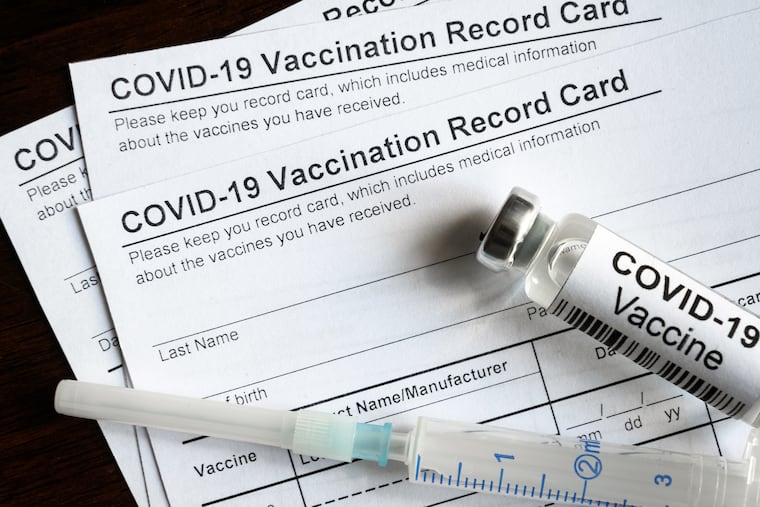A federal lawsuit filed by Bruce Castor argues that vaccine status is protected free speech and nobody’s business
The unions represented in the suit are the National Council of Prison Locals 33 and the American Federation of Government Employees Local 2018, on a U.S. Marine base in Twentynine Palms, Calif.

Federal unions are suing the Biden administration over its vaccine mandate, claiming the issue has become so politically divisive that disclosing one’s vaccination status should be protected free speech. Federal employees shouldn’t be forced to disclose whether they have a vaccine card, the suit claims.
Bruce Castor, former Montgomery County district attorney who defended Donald Trump in his second Senate impeachment trial in February, represents American Federation of Government Employees locals that seek to prohibit the U.S. government from enforcing an executive order requiring that federal employees be vaccinated. The suit was filed in the U.S. District Court for the Eastern District of Pennsylvania.
“If I were to win it would affect all federal union workers,” Castor said. “They are a very influential group.”
Union members who fail to show they’re vaccinated could be publicly stigmatized as “ ‘rightwing extremists,’ or worse,” the suit says. The unions named in the suit are the National Council of Prison Locals 33 and the American Federation of Government Employees Local 2018, on a U.S. Marine base in Twentynine Palms, Calif.
» READ MORE: Biden’s vaccine mandate will require most Philly-area private sector workers to get a jab
Legal argument
Catherine J. Ross, a law professor and First Amendment expert at George Washington University, said that she didn’t think the federal unions’ suit was “frivolous. It’s creative enough to be plausible.” But she added that the lawsuit appears unlikely to succeed because a judge would need to develop “a lot of new law” for Castor’s clients to win.
To sustain the protected speech argument, Castor would first have to convince a judge that the failure to present a vaccine card is a form of speech referred to as “symbolic speech,” Ross said. Symbolic speech would be wearing a cross or a black armband that silently communicates an idea the viewer is likely to understand, she said.
Ross doubts a judge will go for it. The choice not to get vaccinated and the resulting “lack of a vaccine card has at best a tenuous link to speech,” she said.
The suit is part of a tsunami of litigation nationwide over COVID-19 mandates in the workplace for government and private-sector workers. The Biden administration ordered federal workers to be vaccinated by Nov. 22.
Party lines
A Gallup survey and an analysis of voting patterns in blue and red states show a stark divide between vaccination rates and political affiliation, with Democrats more accepting of vaccinations and Republicans less so. According to the Gallup survey released in September, while 92% of respondents who identified as Democrats reported having received at least one vaccine, only 56% of Republicans did.
“Partisanship and vaccination status continue to loom large as factors in how the public views both the U.S. vaccination effort and the government’s response to the pandemic in general,” according to the Kaiser Family Foundation COVID-19 Vaccine Monitor in September.
And though vaccination rates have climbed overall with the delta variant, there remains a core of Americans who do not want to be vaccinated.
» READ MORE: White House: 92% of fed workers under mandate are vaccinated
Shane Fausey, president of the National Council of Prison Locals 33, said in a recent memo to union officials that the 3,500 unionized members who face “potential termination” represent 10% of the prison union membership nationwide. He said terminations could worsen a staffing crisis at federal prisons.
Court fight
Castor, a Republican, filed a similar lawsuit on vaccine mandates for private-sector workers in early October against the University of Pennsylvania Health System, U.S. Secretary of Labor, and the U.S. Secretary of Health and Human Services.
Castor’s client in the Penn lawsuit is Pennsylvania Informed Consent Advocates, which represents the interests of current and former employees of the Philadelphia health system. In September, the University of Pennsylvania Health System said that 99% of its 38,000 employees complied with its COVID-19 vaccination mandate, including 760 who got exemptions or deferrals for religious or medical reasons.
Less than 1%, or about 380, were fired or quit rather than get the shots.
The Philadelphia-based health system has filed to dismiss the suit.
“We are proud to have come together as a group to protect one another and those we care for, and to have set an example for our friends, families, and neighbors that vaccination is a key path out of the pandemic,” a Penn Medicine spokesperson said Thursday.
Judges have mostly ruled in favor of vaccine mandates for health workers, public employees, state university students, and government contractors. “What we’re seeing are courts finding that mandates are lawful and constitutional,” Jennifer Piatt, a deputy director with the Network for Public Health Law, a national nonprofit group based in Minnesota that promotes public health laws and has kept track of the litigation, told the Wall Street Journal.